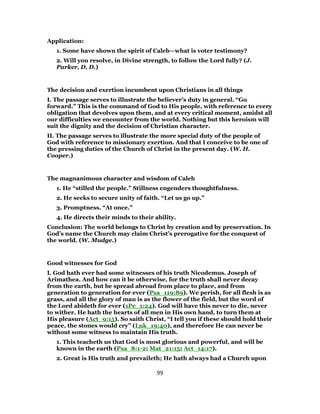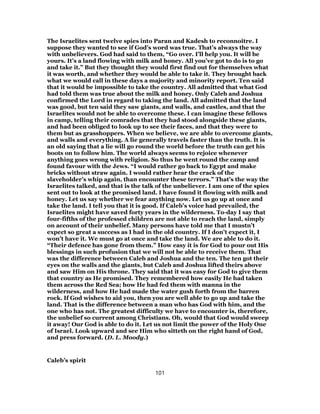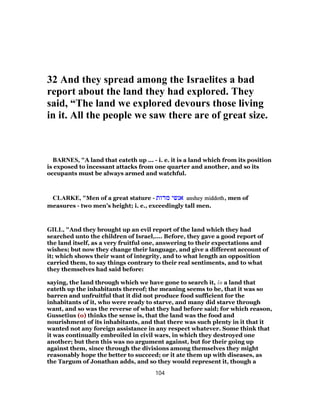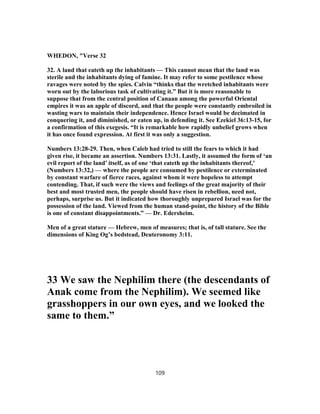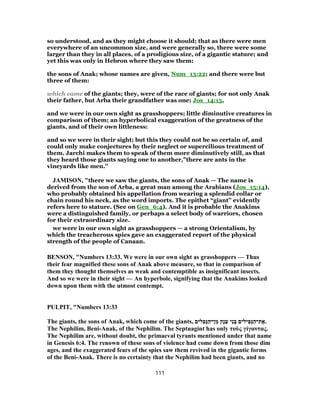The document discusses the biblical account of the Israelites sending spies into Canaan, describing it as a response to their lack of faith despite God's promises. The initiative to send spies originated from the people themselves, reflecting their disbelief in God's word, even though God eventually permitted it to fulfill their request. The text emphasizes the juxtaposition between relying on divine guidance versus human reasoning, illustrating the consequences of doubt in God's providence.
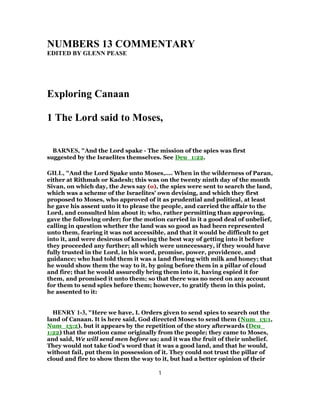
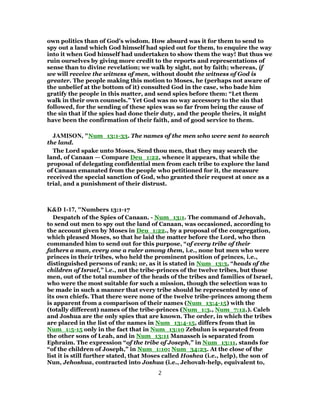

![(1) the cause of sending out spies (Numbers 13:1,2)
(2) the choice of the spies (Numbers 13:2-16)
(3) the commission of the spies (Numbers 13:17-20)
(4) the conduct of the spies (Numbers 13:21-24)
(5) the confirmation of what God had said about Canaan by the spies (Numbers
13:25-27)
(6) the contradiction of God's Word by the majority report of the spies (Numbers
13:28,29), and
(7) the counter-report of the minority (Numbers 13:30), and
(8) the crooked rebuttal by the majority (Numbers 13:31-33)[1]
The unity, consistency, and harmony of this amazing narrative are unassailable.
Never was the criticism any more bankrupt than in the assaults directed against this
chapter. A summary of critical views is that of Wade:
"This narrative is marked by numerous discrepancies, being a fusion of two
accounts drawn from JE and P. In JE the spies start from Kadesh, and the survey is
limited to southern Palestine; the report of land is favorable, but the inhabitants are
alarming, and only Caleb opposes the majority report. In P the spies start from
Paran, the survey extends to the far north boundary of Canaan, and the report of
the country is unfavorable, with both Caleb and Joshua dissenting."[2]
"Kadesh vs. Paran as the starting place ..." There is not a scholar on earth who
knows with certainty the exact location and boundaries of either Paran or Kadesh,
and the conceited assumption that these terms are in any sense contradictory is
absolutely untenable. Kadesh was a station within the much larger district called
Paran. It was natural that both names would appear in a truthful narrative.
"The journey covered only southern Canaan ... it extended all the way to
Hamath ..." Nowhere in the Bible is there any suggestion whatever that the journey
of the spies was limited to southern Canaan. Such a view is mere scholarly
imagination imported into the text. The narrative does not have a summary of all
that the spies did during that forty days, and the mention of the valley of Eschol (in
southern Canaan) was purely incidental to identifying the source of the cluster, and
cannot mean that the spies went nowhere else.
"Caleb alone mentioned as opposing the majority ... both Caleb and Joshua are said
to oppose the majority ..." The first mention of Caleb (Numbers 13:30) came from
his being the leader of the minority and simply cannot mean that he was alone in his
4](https://image.slidesharecdn.com/numbers13commentary-170219125917/85/Numbers-13-commentary-4-320.jpg)
![opposition. In Numbers 14:6, it is revealed that both Joshua and Caleb opposed the
majority report. A discrepancy or contradiction could be alleged here only in the
event that one of the passages said Caleb alone stood against the evil report. Where
is any such statement?
We may summarize all critical fulminations against this chapter in the words of
Keil:
"These `discrepancies' do not exist in the Biblical narrative, but have been
introduced by the critic himself by arbitrary interpolations .... We cannot possibly
suppose that two accounts have been linked or interwoven here ... This style of
narrative is common, not only in the Bible, but also in the historical works of the
Arabs."[3]
"And Jehovah spake unto Moses, saying, Send thou men, that they may spy out the
land of Canaan, which I give unto the children of Israel: of every tribe of their
fathers shall ye send a man, every one a prince among them. And Moses sent them
from the wilderness of Paran according to the commandment of Jehovah: all of
them men who were heads of the children of Israel."
Here at the outset the question arises as to "Whose idea was it?" that the children of
Israel should spy out the land. Here, there is no mention of the people as being
behind such a plan; but in Deuteronomy (Deuteronomy 1:20-22) it is revealed that
the people themselves were behind this proposal. Is this a "contradiction?"
Certainly not. Did not God command Balaam to "go with the men," whereas the
desire and purpose of his doing so originated not with God at all, but in the evil
heart of Balaam (Numbers 22:35)? Another instance in which the same phenomenon
occurs is in the life of Paul. It was the church that sent Paul up to the so-called
"Jerusalem Conference" (Acts 15:2); and yet Paul himself stated that he "went up
by revelation" (Galatians 2:2), indicating that he went by God's commandment and
approval. There are numerous examples of this style of narrative in the Bible, in
which "the whole picture" appears only in the light of "all that the scriptures have
spoken." It can be nothing but a corrupted exegesis that sees supplementary
passages as discrepancies.
As a matter of truth, there is no way that the Israelites should have desired to send
out spies. Was not God their leader? Was not His visible appearance among them
day and night in the phenomenal glory of the fiery cloudy pillar? Did God need any
information that their spies could have discovered? In this episode, the Israelites
were the prototype of all faithless and timid brethren, who, in the face of clear duty,
prefer not to act, but to disguise their unwillingness as prudence in "seeking more
facts."
Their request for spies indicated a lack of faith. They were not trusting God. God
had already spied out the land. He knew all about it. He would not have sent them
to possess the land unless He had known that they were able to take it. When they
5](https://image.slidesharecdn.com/numbers13commentary-170219125917/85/Numbers-13-commentary-5-320.jpg)
![finally did enter it, the giants were still there, and all the difficulties and problems
were still there; but, of course, they took it anyway. Yes, God permitted them to
send out the spies; but "He gave them their request; but sent leanness into their
souls."[4]
There are two things in this passage: (1) the lack of faith on the part of the people;
and (2) the compliance of God with their request, for the purpose of educating them
and letting them "have their foolish way and taste its bitter results."[5]
BENSON, "Numbers 13:1-2. The Israelites being now come to the borders of
Canaan, Moses commanded them, in the name of God, to go up and possess it,
reminding them of his promise to give them the possession of it, and exhorting them
not to fear nor be discouraged, Deuteronomy 1:21. But the unbelieving and
distrustful multitude, forgetting the power and faithfulness of God, were afraid to
venture on this hazardous undertaking, as they thought it, till some persons were
sent to examine and bring them information what sort of country it was, and what
kind of people they should have to contend with. We will send men before us, said
they, and they shall search out the land, and bring us word again, Deuteronomy
1:22. Moses, therefore, in compliance with their request, is directed by God to send
proper persons, chosen from all the tribes, for this purpose. Every one a ruler
among them — Not those called princes of the tribes, in the first chapter of this
book, but men of wisdom and authority, and rulers or officers of an inferior kind.
EBC, "THE SPIES AND THEIR REPORT
Numbers 13:1-33; Numbers 14:1-10
Two narratives at least appear to be united in the thirteenth and fourteenth
chapters. From Numbers 13:17; Numbers 13:22-23, we learn that the spies were
despatched by way of the south, and that they went to Hebron and a little beyond, as
far as the valley of Eshcol. But Numbers 13:21 states that they spied out the land
from the wilderness of Zin, south of the Dead Sea, to the entering in of Hamath. The
latter statement implies that they traversed what were afterwards called Judaea,
Samaria, and Galilee, and penetrated as far as the valley of the Leontes, between the
southern ranges of Libanus and Antilibanus. The one account taken by itself would
make the journey of the spies northward about a hundred miles; the other, three
times as long.
A further difference is this: According to one of the narratives Caleb alone
encourages the people. {Numbers 13:30, Numbers 14:24} But according to the
Numbers 13:8; Numbers 14:6-7, Joshua, as well as Caleb, is among the twelve, and
reports favourably as to the possibility of conquering and possessing Canaan.
Without deciding on the critical points involved, we may find a way of harmonising
the apparent differences. It is quite possible, for instance, that while some of the
6](https://image.slidesharecdn.com/numbers13commentary-170219125917/85/Numbers-13-commentary-6-320.jpg)
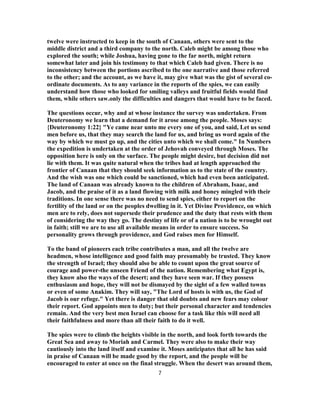











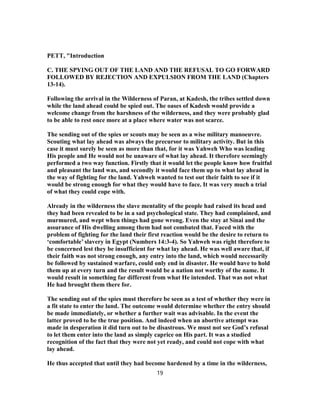

![Numbers 13:1
‘And Yahweh spoke to Moses, saying,’
Again we have confirmation that here we have Yahweh’s words to Moses. The
writer could not make it more clear that he intends us to see what he wrote as the
actual words of Moses, spoken to him by the Voice from the throne (Numbers 7:87).
TRAPP, "Numbers 13:1 And the LORD spake unto Moses, saying,
Ver. 1. And the Lord spake.] Yielding to the people’s importunity, and winking at
their infidelity; for he had before spied out the land for them, [Ezekiel 20:6] and
searched it out, [Deuteronomy 1:33] but that satisfied them not; seeing was, with
them, believing. See Deuteronomy 1:22.
WHEDON, " 1. Send thou men — Although Canaan had been promised to the
Israelites as a God-given inheritance on the condition of their fidelity, yet this
promise did not render the means of conquest unnecessary. All the strategy of war
was required, such as the ambuscade (Joshua 8:13) and spies, (Joshua 2:1,) in order
to success. God’s promises are not designed to supersede, but to stimulate, human
activity. Moreover, this reconnaissance afforded to the spies a test of faith in
Jehovah, and their report tested the whole nation.
Every one a ruler — R.V., “a prince.” Spies in war are usually not men of high
rank, but adventurers who court peril for gain or praise; but these spies, though not
the tribe-princes named in chaps. i and vii, are rulers or princes selected from their
tribes because of their eminence. From Deuteronomy 1:22, we infer that the policy
of sending out the spies originated with the Israelites themselves, and was permitted
by God as a concession to the weakness of their faith, with a warning to “be of good
courage.” Strong faith would have accepted Jehovah’s description of Canaan, and
would have leaned on his ability to bring them in according to his oft-repeated
promise, without any reconnaissance. Thus suggests the Jewish Midrash. The order
of the tribes differs from that in Numbers 1:5-15, only in the separation of Zebulun
from the other sons of Leah in Numbers 13:10, and in Numbers 13:11 Manasseh
from Ephraim, who together constitute the tribe of Joseph, but are always counted
as two tribes, in accordance with the prediction of the dying Jacob in Genesis
48:5-6.
BI 1-20, "Send thou men, that they may search the land of Canaan.
Glimpses of the better land
I. The search.
II. The retreat,
21](https://image.slidesharecdn.com/numbers13commentary-170219125917/85/Numbers-13-commentary-21-320.jpg)









![account of matters, especially in such particulars as do not directly concern the
Divine government and guidance of Israel. It is not, therefore, a serious difficulty
that the record only begins here at the point when God adopted as his own what had
been the demand of the people. If we ask why he so adopted it, the probable answer
is that he knew what secret disaffection prompted it, and to what open rebellion it
would lead. It was better that such disaffection should be allowed to ripen into
rebellion before they entered their promised land. Miserable as the desert
wandering might be, it was yet a discipline which prepared the nation for better
things; whereas the invasion of Canaan without strong faith, courage, and self-
restraint (such as they showed under Joshua) could but have ended in national
disaster and destruction. Of every tribe of their fathers shall ye send a man. This
was not part of the original proposition (Deuteronomy 1:22), but was agreeable to
the general practice in matters of national concern, and was no doubt commanded
in order that the whole people might share in the interest and responsibility of this
survey. Every one a ruler among them. This does not mean that they were to be the
tribe princes (as the names show), for they would not be suitable in respect of age,
nor could they be spared for this service. They were "heads of the children of
Israel" (verse 3), i.e; men of position and repute, but also no doubt comparatively
young and active, as befitted a toilsome and hazardous excursion.
TRAPP, "Numbers 13:2 Send thou men, that they may search the land of Canaan,
which I give unto the children of Israel: of every tribe of their fathers shall ye send a
man, every one a ruler among them.
Ver. 2. Every one a ruler amongst them.] That might be, as Uriah and Zachariah,
[Isaiah 8:2] faithful witnesses; for lying lips become not a prince. [Proverbs 17:7]
3 So at the Lord’s command Moses sent them out
from the Desert of Paran. All of them were
leaders of the Israelites.
GILL, "And Moses, by the commandment of the Lord,.... By his power,
permission, and leave, as Jarchi, that there might be no delay through his
means:
31](https://image.slidesharecdn.com/numbers13commentary-170219125917/85/Numbers-13-commentary-31-320.jpg)
![sent them from the wilderness of Paran; from Rithmah or Kadeshbarnea,
which seem to be one and the same place in that wilderness: this, as before
observed, was on the twenty ninth day of Sivan: See Gill on Num_13:1,
all those were heads of the children of Israel; were not mean and vulgar
men, but persons of rule, who bore some office of magistracy ant
government among the people in their respective tribes.
JAMISON, "those men were heads of the children of Israel — Not the
princes who are named (Num_10:14-16, Num_10:18-20, Num_10:22-27),
but chiefs, leading men though not of the first rank.
PETT, "Numbers 13:3
‘And Moses sent them from the wilderness of Paran according to the commandment
of Yahweh, all of them men who were heads of the children of Israel.’
Ever obedient to Yahweh’s command Moses sent men out from the wilderness of
Paran, where the people were encamped at the oases of the Kadesh region, and all
who were sent were chieftains.
TRAPP, "Numbers 13:3 And Moses by the commandment of the LORD sent them
from the wilderness of Paran: all those men [were] heads of the children of Israel.
Ver. 3. By the commandment of the Lord.] That is, by his permission; {See Trapp on
"Numbers 13:1"} God’s command was, that they should forthwith, without any
further search, go up and possess the land. [Deuteronomy 1:21] Now wicked men
are esteemed unjust, because they act against God’s command, though according to
his decree; like as believers are esteemed just, not because they obey God’s decree,
but his command.
4 These are their names: from the tribe of
Reuben, Shammua son of Zakkur;
HENRY 3-16, " The persons nominated that were to be employed in this
service (Num_13:4, etc.), one of each tribe, that it might appear to be the act
32](https://image.slidesharecdn.com/numbers13commentary-170219125917/85/Numbers-13-commentary-32-320.jpg)

!["Shammua ..." means "heard," the name appearing also in 2 Samuel 5:14;
Nehemiah 11:17; 12:18.
"Shaphat ..." means "judge." This was also the name of Elisha's father.
"Sethur ..." means "hidden."
"Ammiel ..." means "God is my kinsman." The name also appears in the story of
Mephibosheth (2 Samuel 9:4).
"Gaddiel ..." means "God is my fortune." This is the full form of the name Gad.
"Geuel ..." means "majesty of God." It occurs nowhere else in the Bible.
"Igal ..." means "he will redeem." One of David's heroes (2 Samuel 23:36).
"Nahbi ..." means "hidden."
"Palti ..." means "God's deliverance." Also the name of Michal's husband (1
Samuel 25:44).
"Gaddi ..." another form of "Gad."
"Caleb ..." means "dog" and could have been applied to him because of his Gentile
ancestry. He was a Kenizzite (Numbers 32:12).[6]
"Hoshea ..." means "desire of salvation." Moses changed the name to Joshua by
adding the prefix "Jeh" for Jehovah, giving the meaning of "divinely appointed,
head of salvation," or "Savior." The name as changed is the same as "Savior", or
"Jesus."[7]
We cannot leave the discussion of the name Joshua without noticing the fantastic
proposition advanced by some critics to the effect that the P author of this passage
gave the name of Hoshea instead of Joshua, and then invented the story that Moses
changed his name, "in order to defend his view that the name Jehovah could not
have been known before Moses, and so presumably not at the time of Joshua's
birth!"[8] What an insight this gives to the critical NONSENSE about the name
Jehovah having been unknown before Moses. The name of Jehovah appears in the
name of Moses' mother, Jochebed! It was known extensively by the patriarchs of
old, as any student of the Bible may read for himself. The air castle that members of
the critical community have built upon Exodus 6:3 by means of their erroneous
translation of the passage crumbles into nothing in the light of the truth. It is not
true that God said that He was not known prior to the burning bush as "Jehovah."
The proper translation of the verse in question is: "By my name Jehovah was I not
known unto your fathers?"
34](https://image.slidesharecdn.com/numbers13commentary-170219125917/85/Numbers-13-commentary-34-320.jpg)
![The scholarship that supports this is superior in every way to that which denies it.
Exodus 6:3 dogmatically affirms the very truth it is alleged to deny!
Now look at the allegation regarding Hoshea: the "editor of P" was like the critical
scholars today ignorant of the true rendition of the passage in Exodus (how this
could have been true in a prior source of Exodus is indeed a mystery, and also this
editor perverted the name of Joshua to defend his position!) Indeed! Indeed! How
blind is unbelief!
Those interested in a more extensive discussion of this question are invited to see our
exegesis of Exodus 6:3 in this series of commentaries.
"And Moses called Hoshea Joshua ..." This was an exceedingly significant
prophecy. "Moses was looking beyond all the dismal grief and failure about to be
manifested in the people to that Greater Salvation that would at last appear in Jesus
Christ."[9] Whitelaw thought it was "an obvious difficulty" that Joshua had
already been called by his new name in Exodus 17:9 and in all the other places
where he is previously mentioned in the Bible.[10] What difficulty? The text does
not say that this new name was given on the occasion where it is recorded here, but
even if that should be inferred, this narrative written near the end of the forty-year
journeyings of Israel and long after the event here would naturally have referred to
Joshua by the name under which he would be known for all ages. Prolepsis is the
technical word for this. "The new name may have been given earlier, but if the
change was made at this time, the earlier reference would be proleptic. The new
name might have been given after Joshua's defeat of the Amalekites (Exodus
17)."[11]
PETT, "Numbers 13:4-15
‘And these were their names: Of the tribe of Reuben, Shammua the son of Zaccur.
Of the tribe of Simeon, Shaphat the son of Hori. Of the tribe of Judah, Caleb the son
of Jephunneh. Of the tribe of Issachar, Igal the son of Joseph. Of the tribe of
Ephraim, Hoshea the son of Nun. Of the tribe of Benjamin, Palti the son of Raphu.
Of the tribe of Zebulun, Gaddiel the son of Sodi. Of the tribe of Joseph, namely, of
the tribe of Manasseh, Gaddi the son of Susi. Of the tribe of Dan, Ammiel the son of
Gemalli. Of the tribe of Asher, Sethur the son of Michael. Of the tribe of Naphtali,
Nahbi the son of Vophsi. Of the tribe of Gad, Geuel the son of Machi.’
The names of the chosen scouts were now given. They were different from the
princes of chapter 1 but that was to be expected. Those were the supreme heads of
the tribe, these were younger princes, the men who would also be responsible to lead
into battle. The use of ‘Hoshea’ instead of Joshua confirms that the list is indeed
ancient. No later generation would have inserted his name in that fashion.
PULPIT, "Numbers 13:4
35](https://image.slidesharecdn.com/numbers13commentary-170219125917/85/Numbers-13-commentary-35-320.jpg)
![These were their names. None of these names occur elsewhere, except those of Caleb
and Joshua. The order of the tribes is the same as in Joshua 1:1-18; except that
Zebulun is separated from the other sons of Leah, and placed after Benjamin, while
the two sons of Joseph are separated from one another. In Joshua 1:11 "the tribe of
Joseph" is explained to be "the tribe of Manasseh;" elsewhere it is either common to
both, or confined to Ephraim (see Revelation 7:8, and cf. Ezekiel 37:16). No spy was
sent for the tribe of Levi, because it was now understood to have no territorial
claims upon the land of promise, and to stand altogether by itself in relation to the
national hopes and duties.
5 from the tribe of Simeon, Shaphat son of Hori;
6 from the tribe of Judah, Caleb son of
Jephunneh;
PULPIT, "Numbers 13:6
Caleb the son of Jephunneh. In Numbers 32:12 he is called "the Kenezite" ( זּיִנ ְקַּה ),
which appears in Genesis 15:19 as the name of one of the ancient races inhabiting
the promised land. It is possible that Jephunneh may have been connected by
descent or otherwise with this race; it is more likely that the similarity of name was
accidental. The younger son of Jephunneh, the father of Othniel, was a Kenaz ( ַזנ ְק ),
and so was Caleb's grandson (see on Joshua 15:17; 1 Chronicles 4:13, 1 Chronicles
4:15). Kenaz was also an Edomitish name.
TRAPP, "Verse 6
Numbers 13:6 Of the tribe of Judah, Caleb the son of Jephunneh.
Ver. 6. Caleb.] A hearty man, according to his name; as Bishop Hooper, martyr, was
called hearty Hooper; and as one of our Richards was called Coeur-de-lion. It is
now but two days since, from a sweet friend, (a) living at Hartford in New England,
I received a loving letter, dated Sept. 12, 1659, and therein this following passage,
"Old Mr John Wilson, pastor at Boston, (b) is in very good health, a hearty old good
man still." A hearty good man indeed; I have for forty years almost known him to
be a cordial Caleb, one who from his youth up, hath "fulfilled after God - followed
him fully," and been of "another spirit" than the most are found to be. And to hear
36](https://image.slidesharecdn.com/numbers13commentary-170219125917/85/Numbers-13-commentary-36-320.jpg)
![that the Lord still lengtheneth out his life, and keepeth up his young zeal with his
old discretion, which was Mr Greenham’s great desire to his last, as it is no small
comfort unto me; so, for the good respect I do deservedly bear to that good old man,
I could not but here tell my reader so. Oh how well may he, with a very little
variation, take up Caleb’s words to Joshua, hic fidus Achates, and say, "Forty years
old was I" when many worthy zealots of old England "sent me to espy out this good
land, and I brought them word again, as it was in my heart. Nevertheless my
brethren that went up with me, made the heart of the people melt; but I wholly
followed the Lord my God. And now behold the Lord hath kept me alive these forty
and five years. And now, lo, I am well toward fourscore year old: As yet I am as
strong this day as I was many years since: as my strength was then, even so is my
strength now for the Lord’s wars, both to go out and to come in." [Joshua 14:7-8;
Joshua 14:10-11] I add no more but, Go forth in this thy might, thou valiant man:
and do thou still "worthily in Ephrata," and be "famous in Bethlehem." Serus in
coelum redeas, Iohannes; come thou to thy grave in a lusty old age, (c) "like as a
shock of corn cometh in his season." [Job 5:26]
7 from the tribe of Issachar, Igal son of Joseph;
8 from the tribe of Ephraim, Hoshea son of Nun;
9 from the tribe of Benjamin, Palti son of Raphu;
10 from the tribe of Zebulun, Gaddiel son of Sodi;
11 from the tribe of Manasseh (a tribe of Joseph),
Gaddi son of Susi;
COKE, "Numbers 13:11. Of the tribe of Joseph, &c.— That is to say, of that part of
the tribe of Joseph whereof Manasseh was the chief. Mention is made of the tribe of
Ephraim, the other branch of the tribe of Joseph, in the 8th verse. The name of
Joseph was common to each; but Poole is of opinion, that it is given in this
particular manner to Manasseh, to shew in the stronger point of view the crime of
the chief of this tribe, who conducted himself so unworthily of his great forefather
Joseph. Ainsworth, however, thinks that Manasseh is only mentioned thus, as being
the eldest.
37](https://image.slidesharecdn.com/numbers13commentary-170219125917/85/Numbers-13-commentary-37-320.jpg)
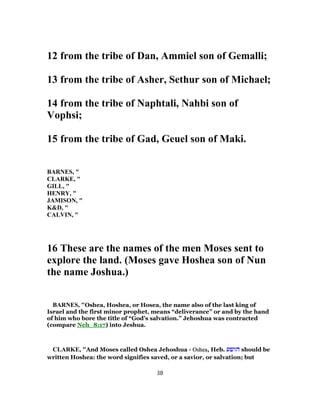
![,יהושע he shall save, or the salvation of God; a letter, says Calmet, of the
incommunicable name of God, being added to his former name. This was
not the first time in which he had the name Joshua; see Exo_17:9 (note),
and the note there. Some suppose he had this change of name in
consequence of his victory over Amalek; see Exo_17:13, Exo_17:14.
GILL, "These are the names of the men which Moses sent to spy out the
land,.... Which is observed after the catalogue is given of them, Num_13:4;
and this is repeated that their names may be taken notice of, which stand on
record to the disgrace of the greater number of them, and to the honour of
two only, Joshua and Caleb; and on the former the following remark is
made:
and Moses called Oshea the son of Nun, Jehoshua; whether it was at this
time that Moses gave him this name is not certain; if it was, then he is called
so before by anticipation, for he is several times called so before this, and
even the first time we hear of him, Exo_17:9; wherefore Chaskuni reads it,
Moses had called; but Jarchi thinks it was now given him, and that Moses
prayed for him יושיעך ,יה "Jah" or "Jehovah" save thee from the counsel of
the spies: the name is the same with Jesus, as appears from Heb_4:8; and a
type he was of Christ the Saviour, whose name is so called, because he saves
his people from their sins, Mat_1:21; and brings them to heaven, as Joshua
was the instrument of saving the Israelites and bringing them into the land
of Canaan.
JAMISON, "Oshea — that is, “a desire of salvation.” Jehoshua, by prefixing
the name of God, means “divinely appointed,” “head of salvation,”
“Saviour,” the same as Jesus [Mat_1:21, Margin].
COKE, "Numbers 13:16. Moses called Oshea—Jehoshua— Upon what occasion
Moses gave him this name, is uncertain; but we find him called Joshua, Exodus 17:9
when he went to fight with the Amalekites. The exchange of a person's name was a
mark of honour, as appears from Genesis 17:5; Genesis 17:15 and Genesis 32:28.
Moses, therefore, by changing the name of the son of Nun from Oshea (which
signifies save thou) to Joshua, (which signifies he shall save) designed to foreshew
that it was with reason his parents had given him that name, since he was truly to be
the Saviour and deliverer of his people. Joshua is of the same import with Jesus;
and so it is translated by the LXX, Acts 7:45. Hebrews 4:8. Being appointed to save
the people, and bring them into possession of the promised land, he was a proper
type, says Bishop Kidder, of the Messiah, the Saviour of the world. If the name of
each of these rulers whom Moses chose conveyed an expressive meaning, one might
believe that their opinion had some foundation, who pretend, that Moses chose
Joshua because his name conveyed such a fortunate omen. The heathens were
always remarkably careful not to employ in their most important affairs, those
whose names might be construed into any sinister or unfortunate omen. See Cicero,
39](https://image.slidesharecdn.com/numbers13commentary-170219125917/85/Numbers-13-commentary-39-320.jpg)

![registers. As to the significance of the change, it is not easy to estimate it aright. On
the one hand, the sacred syllable entered into so many of the Jewish names that it
could not have seemed a very marked change; on the other hand, the fact that our
Saviour received the same name because he was our Saviour throws a halo of glory
about it which we cannot ignore. In the Divine providence Hoshea became Joshua
because he was destined to be the temporal saviour of his people, and to lead them
into their promised rest.
TRAPP, "Numbers 13:16 These [are] the names of the men which Moses sent to spy
out the land. And Moses called Oshea the son of Nun Jehoshua.
Ver. 16. And Moses called Oshea the son of Nun Jehoshua.] His name was now
changed from Save us O God, to God shall save us. Under the law which brings us,
as it were, into a wilderness, we may desire, wish, and pray that there were a
Saviour: but under the gospel, we are sure of salvation, and that our Jehoshua hath
bound himself "to fulfil all righteousness" for us.
WHEDON, "16. Oshea — Hebrew, help, is changed into Jehoshua or Joshua,
Hebrew, Jehovah-help. See Introduction to Joshua, page 7. It was an occasional
custom for Hebrews to change their names if, at any point in their lives, there was a
radical change of character or a marked transition from obscurity to distinction.
Genesis 17:5; Genesis 32:28. It is to be noted that the exact time when Moses made
this change is not indicated here. The change may have been previously made, while
attention is called to it here. He is called Joshua in Exodus 17:9; Exodus 17:13;
Exodus 24:13; Exodus 32:17; Exodus 33:11; Numbers 11:28.
17 When Moses sent them to explore Canaan, he
said, “Go up through the Negev and on into the
hill country.
BARNES, "Southward - Rather, “by the Negeb,” or south-country; a well-
defined tract of territory forming the southernmost and least fertile portion
of the land of Canaan and of the subsequent inheritance of Judah. It
41](https://image.slidesharecdn.com/numbers13commentary-170219125917/85/Numbers-13-commentary-41-320.jpg)

![open villages or in walled towns, - whether the woods were standing as in
those countries that are uncultivated, through the unskillfulness and
slothfulness of the inhabitants, or whether the woods were cut down, and
the country made champaign, for the convenience of tillage. These were the
things they were to enquire about. Perhaps there had not been of late years
such commerce between Egypt and Canaan as there was in Jacob's time,
else they might have informed themselves of these things without sending
men on purpose to search. See the advantage we may derive from books and
learning, which acquaint those that are curious and inquisitive with the
state of foreign countries, at a much greater distance than Canaan was now
from Israel, without this trouble and expense.
IV. Moses dismisses the spies with this charge, Be of good courage,
intimating, not only that they should be themselves encouraged against the
difficulties of this expedition, but that they should bring an encouraging
account to the people and make the best of every thing. It was not only a
great undertaking they were put upon, which required good management
and resolution, but it was a great trust that was reposed in them, which
required that they should be faithful.
JAMISON, "Get you up this way ... , and go up into the mountain — Mount
Seir (Deu_1:2), which lay directly from Sinai across the wilderness of
Paran, in a northeasterly direction into the southern parts of the promised
land.
COFFMAN, ""And Moses sent them to spy out the land of Canaan, and said unto
them, Get up this way by the South, and go up into the hill-country: and see the
land, what it is; and the people that dwell therein, whether they are strong or weak,
whether they are few or many; and what the land is that they dwell in, whether it is
good or bad; and what cities they are that they dwell in, whether in camps, or in
strongholds; and what the land is, whether it is fat or lean, whether there is wood
therein or not. And be ye of good courage, and bring of the fruit of the land. Now
the time was the time of the first-ripe grapes."
"Get you up this way by the South ..." Literally, "by the Negeb"[12] The Negeb is
called the South Country and is a well-defined area lying from Kadesh North to the
vicinity of Hebron, and covering the whole area between the Jordan and Dead Sea
valley to the Mediterranean.
"The first-ripe grapes ..." "The first-ripe grapes came in late July or early August,
but the full vintage came in September and October."[13] This corresponds exactly
with the time elapsed since their leaving Sinai.
BENSON, "Verse 17-18
Numbers 13:17-18. Southward — Into the southern part of Canaan, which was the
43](https://image.slidesharecdn.com/numbers13commentary-170219125917/85/Numbers-13-commentary-43-320.jpg)

![substance, and who dwelt there, whether they were strong or weak, and whether
they were few or many. This would clearly determine what their next action should
be.
He had good reason for the direction he chose. That was where Abraham had spent
many years. It was very much ‘the land of their fathers’. Knowledgeable about his
people’s history his eyes were especially fixed on that portion of the land. Possibly
also he recognised that it would be easier to capture the hill country, where there
would be no chariots and fewer cities, dealing with the chariots later.
The Scouts Were To Bring Back News of the Strength and Goodness Of the Land
(Numbers 13:19-20).
PULPIT, "Numbers 13:17
Get you up this way southward. Rather, "get you up there ( ֶהז ) in the Negeb." The
Negeb, meaning literally "the dryness," was the south-western district of Canaan,
which bordered upon the desert, and partook more or less of its character. Except
where springs existed, and irrigation could be carried out, it was unfit for settled
habitation. See Joshua 15:19; 1:15, where the same word is used. Go up into the
mountain. From the Negeb they were to make their way into the mountain or hill
country which formed the back-bone of Southern Palestine, from the Wady Murreh
on the south to the plain of Esdraelon on the north. In after ages it formed the
permanent center of the Jewish race and Jewish power. Cf. 1:9 where the three
natural divisions of Southern Palestine are mentioned together: רָהָח ( ἡ ὀρεινή), the
mountain; ֶבגֶגַּה ( ὁ νότος), the steppe; ָהלֵפ ְשַּׁה ( ἡ πεδινή), the maritime plain.
TRAPP, "Numbers 13:17 And Moses sent them to spy out the land of Canaan, and
said unto them, Get you up this [way] southward, and go up into the mountain:
Ver. 17. Go up into the mountain.] This was the great mountain of Seir, which
encloseth Palestine on that side.
WHEDON, " 17. Southward — Hebrew, Negeb, or South-Country. “As a
geographical term the name has been entirely ignored in the English version, where
the word is invariably translated ‘the south,’ (as a point of the compass;) and the
misapprehension has given rise to several absurd contradictions in terms. Thus,
when the spies went up from Kadesh we are told that Moses ‘said unto them, Get
you up this way southward,’ [R.V., ‘by’ (marg. ‘into’) ‘the South;’] ‘and they went
up by the South, and came unto Hebron.’ As Hebron certainly lay to the north of
Kadesh, this express mention of the South is not only meaningless, but inaccurate.
But if we render the word ‘South Country,’ applying it to the mountain plateau in
the north-west corner of the Tih, all difficulty vanishes, and the words of the text are
45](https://image.slidesharecdn.com/numbers13commentary-170219125917/85/Numbers-13-commentary-45-320.jpg)
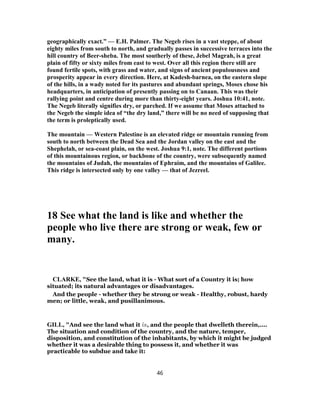
![whether they be strong or weak, few or many; whether able-bodied men fit
for war, and of spirit, strength, and courage, or feeble and pusillanimous,
weak and timorous; and whether their number was small or great, by which
they would be capable of judging whether they were in a state and condition
to defend themselves or not, and whether a conquest of them was easy or
not; the last of the two things in the preceding clause is first particularly
explained and enlarged upon, as is usual in the Hebrew language.
K&D, "Num_13:18-20
They were to see the land, “what it was,” i.e., what was its character, and
the people that dwelt in it, whether they were strong, i.e., courageous and
brave, or weak, i.e., spiritless and timid, and whether they were little or
great, i.e., numerically; (Num_13:19) what the land was, whether good or
bad, sc., with regard to climate and cultivation, and whether the towns were
camps, i.e., open villages and hamlets, or fortified places; also (Num_13:20)
whether the land was fat or lean, i.e., whether it had a fertile soil or not, and
whether there were trees in it or not. All this they were to search out
courageously (ֵקז ַח ְת ִ,ה to show one's self courageous in any occupation), and
to fetch (some) of the fruits of the land, as it was the time of the first-ripe
grapes. In Palestine the first grapes ripen as early as August, and sometimes
even in July (vid., Robinson, ii. 100, ii. 611), whilst the vintage takes place in
September and October.
CALVIN, "18.And see the land what it is. The counsel of Moses had this object, that
the people might be made aware how rich and fertile the land was; for a barren
country does not support a large population; and the healthfulness of a locality is
inferred from the rigor of its inhabitants, tie, therefore, chiefly insists on the
goodness of the land and its abundant production of fruits. Still, perhaps, God
would intentionally have the Israelites forewarned, that they would have to do with
strong and powerful enemies; lest they might be alarmed and discouraged at
suddenly beholding them. But the main point was, that the pleasantness and fertility
of the land might allure them to take possession of it.
PULPIT, "Whether they be strong or weak, few or many. It would appear that
Moses was guilty of some indiscretion at least in giving these directions. Whether the
people were strong or weak, many or few, should have been nothing to the Israelites.
It was God that gave them the land; they had only to take possession boldly.
TRAPP, "Numbers 13:18 And see the land, what it [is]; and the people that dwelleth
therein, whether they [be] strong or weak, few or many;
Ver. 18. See the land.] Two and two likely he sent them, and by several ways: as our
Lord also did his seventy disciples.
47](https://image.slidesharecdn.com/numbers13commentary-170219125917/85/Numbers-13-commentary-47-320.jpg)



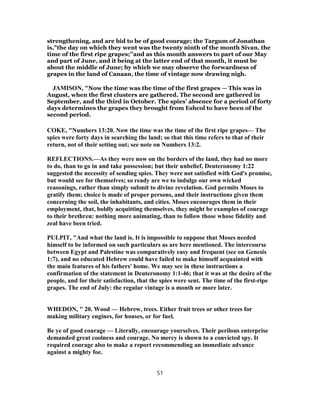



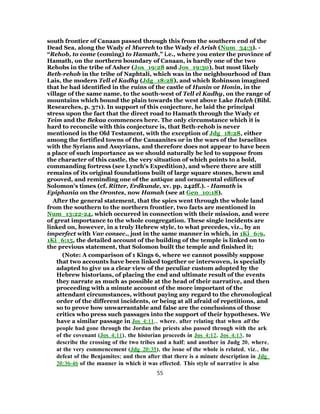

![they bear it upon a staff between two; they brought also of the pomegranates, and of
the figs. That place was called the valley of Eshcol, because of the cluster which the
children of Israel cut down from thence."
"To the entrance of Hamath ..." Throughout the Bible, Hamath is repeatedly
referred to as the North gateway to Palestine. Jeroboam restored the ancient
Solomonic empire "from the entrance of Hamath," etc. (2 Kings 14:25).
"And came unto Hebron ..." This was a very old city, dating from a time about 1600
B.C.[14] or even as early as 2000 B.C.[15] Hebron was known to the patriarchs
under its older name Kiriath-Arba. Arba was the father of Anak (Joshua 15:13),
and gave Kiriath-Arba its name (City of Arba).[16] Descendants of Arba through
Anak, the Anakim, mentioned here as Ahiman, Sheshai, and Talmai, could have
been descendant tribes, not merely individuals. They were still in the vicinity of
Hebron when Caleb became their eventual destroyer (Joshua 15:14).
"Seven years before Zoan ..." Who but Moses could have known when Zoan, the
great Egyptian city of Tanis, a magnificent city on the Nile Delta and having a
summer residence of the Pharaohs, was founded? Whitelaw was correct in the
discernment that such information shows that "Moses had access to the archives of
Egypt through the priests who had provided his education in Egypt."[17] This
comment noting that Hebron was founded even before Tanis has no connection
whatever in the context, appearing as totally irrelevant and unnecessary. But this
insertion into the holy record of a fragment of history so minute and unimportant
proves that "No one but Moses could have written it."[18] No later writer could
have had any such information, and there could have existed no reason whatever for
his inventing it. Many apparently trivial things such as this afford cumulative
evidence of the Divinity of the Pentateuch that defies all denials.
"One cluster of grapes ..." How big, really, was it and why did they appoint two
men to carry it? Most current commentators suppose that it was carried in such a
manner in order to preserve the grapes, and not because of the size of the cluster.
We have no opinion about it, but the diversity of views on this is of interest. Adam
Clarke testified that he himself had cut down such a cluster that weighed 20
pounds.[19] Pliny is credited with the statement that bunches of grapes were known
to be larger than an infant, and "Paul Lucas declared that he had seen bunches of
grapes at Damascus that weighed over forty-five pounds"![20]
COKE, "Numbers 13:21. From the Wilderness of Zin, &c.— Not that which is
called the Wilderness of Sin, Exodus 16:1 for that lay near to Egypt, south-west of
Canaan; but this was a wilderness on the south-east of Canaan, not far from Kadesh
Barnea, chap. Numbers 34:3. Joshua 1:3. Rehob was a city in the north of Canaan
near the sea coast, not far from Zidon, which fell to the lot of the tribe of Asher,
Joshua 19:28. Hamath, afterwards called Epiphania, was not far from Rehob, and
bounded Judea on the north; (see chap. Numbers 34:8.) so that the spies took a
survey of the whole land, from one end of it to the other, south and north;
57](https://image.slidesharecdn.com/numbers13commentary-170219125917/85/Numbers-13-commentary-57-320.jpg)

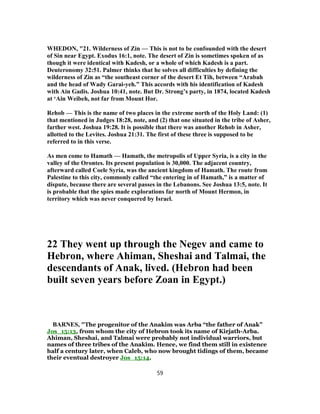



![reason for the abrupt insertion here of a fragment of history so minute and in itself
so unimportant. There is, however, no one but Moses to whom the statement can
with any sort of likelihood be traced; a later writer could have had no authority for
making the statement, and no possible reason for inventing it.
TRAPP, "Numbers 13:22 And they ascended by the south, and came unto Hebron;
where Ahiman, Sheshai, and Talmai, the children of Anak, [were]. (Now Hebron
was built seven years before Zoan in Egypt.)
Ver. 22. Was built seven years before Zoan.] And so was one of the ancientest cities
of the world, seeing it did contend with the ancientest and chiefest city of Egypt.
[Isaiah 19:11] Hebron signifies an association: there lay buried those three reverend
couples, Abraham and Sarah, Isaac and Rebecca, Jacob and Leah. [Genesis 23:19;
Genesis 35:27-29] Here David began his reign over Israel, [2 Samuel 2:1] and hither
came Mary to visit Elizabeth. [Luke 1:39]
WHEDON, "Verse 22
22. By the south — See Numbers 13:17, note. They descended by Hebron and
explored the route into the Negeb, or South, (properly capitalized by the R.V.,) by
the western edge of the mountains. In one of these extensive valleys — perhaps in
Wady Hanein, where miles of grape mounds even now meet the eye — they cut the
gigantic cluster of grapes.
Hebron — An ancient city twenty miles south of Jerusalem, described in Joshua
10:3, note. “It is plausibly conjectured that on leaving the wilderness of Paran they
first entered the Negeb, or South-Country, and passed up the eastern side of the
land ‘unto Rehob, as men come to Hamath,’ in the extreme north, and then
descended along the central and western slopes, and from the valley of Eshcol
(Hebron) bore the grapes, pomegranates, and figs, and so brought verbal and
tangible report of the country. This is the most satisfactory way of explaining the
seeming contradiction in the account as given in Numbers 13:21-22.” — Ridgaway.
The children of Anak — A race of giants in stature (Anak literally signifying long-
necked) and strength. Anak is regarded as the name of a race rather than that of an
individual. Of this race there were near Hebron three tribes, whose chiefs were
Ahiman, Sheshai, and Talmai. “That there were in times past men of extraordinary
size is a tradition wonderfully prevalent to this day all over the East. It not only runs
through legendary lore, but is embodied in numerous monuments of a more
substantial character. The truth appears to be that there were amongst the
governing races of primitive times certain families of great stature. This peculiarity
was carefully perpetuated and increased by such marriage restrictions as tended to
that result, and something similar has been found amongst the inhabitants of the
Pacific islands.” — W.M. Thomson. Notwithstanding their terrific aspect they were
63](https://image.slidesharecdn.com/numbers13commentary-170219125917/85/Numbers-13-commentary-63-320.jpg)
![dispossessed by Joshua and utterly driven from the land, except a small remnant of
refugees to Philistia, who were, perhaps, the ancestors of Goliath of Gath. Joshua
11:21-22. Their chief city, Hebron, fell to the lot of Caleb, who drove out the three
tribes of the Anakim. Joshua 15:14. Zoan in Egypt was situated on the eastern
border of the Nile delta. Its classical name was Tanis, and its Egyptian name Avaris,
“departure,” the point of departure for caravans going north and east. It is
supposed to have been seized by the shepherd kings about 2080 B.C., and to have
been made the seat of their dynasty in Lower Egypt. Here, according to the
Egyptian records, they built a temple to Set, the Egyptian Baal, and reigned 511
years. The past few years have been rich in discoveries of historical value in San, the
site of ancient Zoan. Obelisks, sphinxes, sculptures, and historical tablets attest its
former magnificence. The connexion here of Hebron with Zoan suggests that the
founders of both cities were of the same race. It is evident that the writer was well
versed in Egyptian history.
23 When they reached the Valley of Eshkol,[a]
they cut off a branch bearing a single cluster of
grapes. Two of them carried it on a pole between
them, along with some pomegranates and figs.
GILL, "The place was called the brook of Eshcol,.... That is, in later times:
because of the cluster of grapes which the children of Israel cut down from
thence; the word "Eschol" signifying a "cluster"; and this cluster was typical
of Christ, who may be compared to this, as he is to a cluster of camphire,
Son_1:14; there being in him a "cluster" of all perfections, of all the
perfections of deity, the whole fulness of the Godhead dwelling bodily in
him; and of all human perfections, he being in all things like unto his
people, excepting sin; and there being also a cluster of all the graces and
gifts of the Spirit without measure in him, as man; and of all the blessings of
grace for his people, as Mediator; and of all the exceeding great and
precious promises of the covenant of grace. The "staff", on which this was
carried, may denote the ministration of the Gospel, which may seem mean
and despicable in itself, but is the means of carrying the name of Christ, and
the things of Christ, about in the world; see Act_9:15; and the "two" men
which bore it, may signify the prophets of the Old Testament, and the
64](https://image.slidesharecdn.com/numbers13commentary-170219125917/85/Numbers-13-commentary-64-320.jpg)


![PULPIT, "Numbers 13:23
The brook of Eshcol. Rather, "the valley of Eshcol," for it is not a land of brooks.
Probably between Hebron and Jerusalem, where the grapes are still exceptionally
fine, and the dusters of great size. They bare it between two on a staff, not on
account of its weight, but simply in order not to spoil it. Common sense dictates the
like precaution still in like cases.
TRAPP, "Numbers 13:23 And they came unto the brook of Eshcol, and cut down
from thence a branch with one cluster of grapes, and they bare it between two upon
a staff; and [they brought] of the pomegranates, and of the figs.
Ver. 23. And they bare it between two.] Christum utrique portamus, ut botrum
Israelitae, tum illi qui adventum Christi antecesserunt, tum nos, &c. So Christ is
borne between the believers of both Testaments.
WHEDON, " 23. The brook of Eshcol — A wady near Hebron. Says Tristram: “The
walk up the valley revealed to us for the first time what Judah was everywhere else
in the days of its prosperity. Bare and stony as are the hillsides, not an inch of space
is lost. Terraces, where the ground is not too rocky, support the soil. Ancient
vineyards cling to the lower slopes; olive, mulberry, almond, fig, and pomegranate
trees fill every available cranny to the very crest, while the bottom of the valley is
carefully tilled for corn, carrots, and cauliflowers, which will soon give place to
melons and cucumbers. The culture is equal to that of Malta. Those who doubt the
ancient records of the population, or the census of David, have only to look at this
valley and by the light of its commentary to read the story of those cities.” Dr.
Robinson says of the vineyards of Eshcol that “they are very fine, and produce the
best grapes in all the country, and pomegranates and figs, as well as apricots,
quinces, and the like, still grow there in great abundance.” Chap. Numbers 32:9,
note.
Between two upon a staff — On the return of the spies from the north they plucked
a sample cluster and carried it upon a staff, not because of its great weight, but for
the better protection of the grapes against being bruised. There are clusters of
grapes produced in Palestine which weigh twelve pounds. By careful culture
bunches weighing nearly twenty pounds have been produced. “The vine was the
emblem of the nation on the coins of the Maccabees, and in the colossal cluster of
golden grapes which overhung the porch of the second temple; and the grapes of
Judah still mark the tombstones of the Hebrew races in the oldest of their European
cemeteries at Prague.” — Stanley.
Pomegranates — A rich, delightful fruit of the apple kind, sometimes called
“grained apples,” of somewhat the same medicinal virtues as the quince; its juice is
like wine. It is ever-green, and forms rather a collection of stems, like coppice-wood,
67](https://image.slidesharecdn.com/numbers13commentary-170219125917/85/Numbers-13-commentary-67-320.jpg)


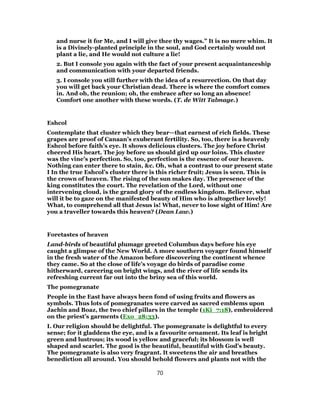

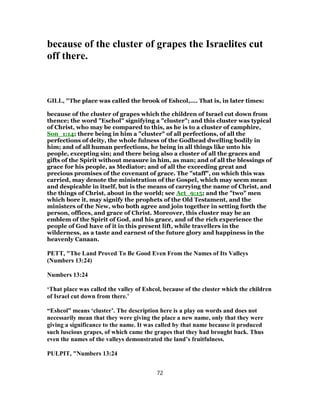


![to a large area, and Kadesh referred to a particular station that served as the
headquarters of Israel for some 38 years after the events of this chapter.
"Kadesh was the scene of a great number of important events described in the
following chapters of Numbers, and it stands out as the most important and
conspicuous place of Israel's encampment after their departure from Sinai."[21]
The most important event of all, however, was the rebellion of Israel in this very
chapter. It drastically changed the course of their history.
The spies, at least the ten faithless ones, had gone on that expedition looking for
reasons why they should NOT try to take Canaan, and, of course, they found what
they were seeking. They presented their report very skillfully, pretending to be very
factual and objective in their report, but the facts they presented were designed for
one thing only, that of discouraging the people from moving as God commanded.
Note that obtrusive "howbeit" (Numbers 13:28). They meant only one thing, "WE
CANNOT TAKE THE LAND." The whole trouble here was that the leaders simply
did not believe God.
It is a bad sign when unbelief sends out sense to be its scout, pretending to verify
God's Word by human confirmation. Not to believe God unless a jury of twelve of
ourselves agrees is the same as not believing God at all, for it is not God but their
own contemporaries that they believe after all.[22]
BENSON, "Numbers 13:25. They returned after forty days — It is a wonder the
people had patience to stay forty days, when they were just ready to enter Canaan,
under all the assurances of success they could have from the divine power, proved
by a constant series of miracles, that had hitherto attended them. But they
distrusted God, and chose to be held in suspense by their own counsels, rather than
to rest upon God’s promise! How much do we stand in our own light by unbelief!
PETT, "The Scouts Return, Having Been Successful (Numbers 13:25).
Numbers 13:25
‘And they returned from spying out the land at the end of forty days.’
The whole procedure had taken forty days. This was not only a reasonable amount
of time for their endeavours (they would not hang about) but also indicated a period
of testing as ‘forty’ so often does (Genesis 7:4; Genesis 7:12; Exodus 24:18). The
land was being tested out for its possibilities and its dangers, and the people were
being tested as they waited. It was now time to see the result of the test.
75](https://image.slidesharecdn.com/numbers13commentary-170219125917/85/Numbers-13-commentary-75-320.jpg)
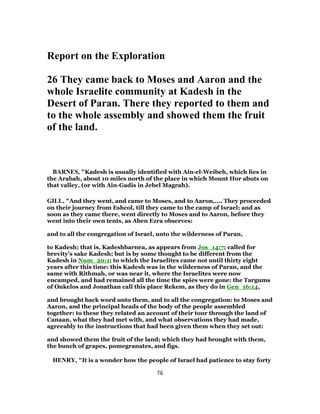
![days for the return of their spies, when they were just ready to enter
Canaan, under all the assurances of success they could have from the divine
power, and a constant series of miracles that had hitherto attended them;
but they distrusted God's power and promise, and were willing to be held in
suspense by their own counsels, rather than be brought to a certainty by
God's covenant. How much do we stand in our own light by our unbelief!
Well, at length the messengers return, but they agree not in their report.
I. The major part discourage the people from going forward to Canaan;
and justly are the Israelites left to this temptation, for putting so much
confidence in the judgment of men, when they had the word of God to trust
to. It is a righteous thing with God to give those up to strong delusions who
will not receive his truth in the love of it.
JAMISON, "they came ... to Kadesh — an important encampment of the
Israelites. But its exact situation is not definitely known, nor is it
determined whether it is the same or a different place from Kadesh-barnea.
It is supposed to be identical with Ain-el-Weibeh, a famous spring on the
eastern side of the desert [Robinson], or also with Petra [Stanley].
COKE, "Numbers 13:26. To Kadesh— Or Kadesh Barnea: thus the place is marked
out from whence they were sent; see the note on chap. Numbers 12:16 and Numbers
20:1. "A late ingenious author," says Dr. Shaw, "has situated Kadesh Barnea at
eight hours, or twenty miles, distance only from Mount Sinai; which, I presume,
cannot be admitted, for various reasons: because several texts in Scripture
insinuate, that Kadesh lay at a much greater distance: thus, in Deuteronomy 1:19 it
is said, they departed from Horeb through that great and terrible wilderness, (which
supposes by far a greater extent of time and place,) and came to Kadesh Barnea;
and in Deuteronomy 9:23. When the Lord sent you from Kadesh Barnea to possess
the land, which (Numbers 20:16.) is described to be a city in the utmost part of the
border of Edom; the border of the land of Edom and that of the land of promise
being contiguous, and, in fact, the very same; and farther Deuteronomy 1:2 it is
expressly said, that there are eleven days journey from Horeb by the way of mount
Seir to Kadeash Barnea, which, from the context, cannot be otherwise understood,
than of marching along the direct road; for Moses here intimates how soon the
Israelites might have entered upon the borders of the land of promise, if they had
not been a stubborn and rebellious people; whereas a number of their stations
betwixt Sinai and Kadesh, as they are particularly enumerated, Numbers 33. (each
of which must have been at least one day's journey) appear to be twice as many, or
twenty-one, in which they are said with great truth and propriety, Psalms 107:4 to
have wandered in the wilderness out of the way, and in Deuteronomy 2:1 to have
encompassed mount Seir, rather than to have travelled directly through it. If then
we allow ten miles for each of these eleven days journey, (and fewer, I presume,
cannot well be insisted upon) the distance of Kadesh from mount Sinai will be about
an hundred and ten miles. That ten miles a day (I mean in a direct line, without
considering the deviations which are every where more or less) were equivalent to
one day's journey, may be further proved from the history of these spies, who
77](https://image.slidesharecdn.com/numbers13commentary-170219125917/85/Numbers-13-commentary-77-320.jpg)
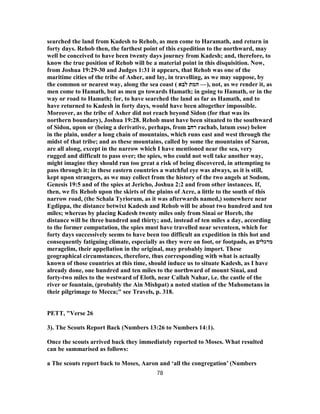

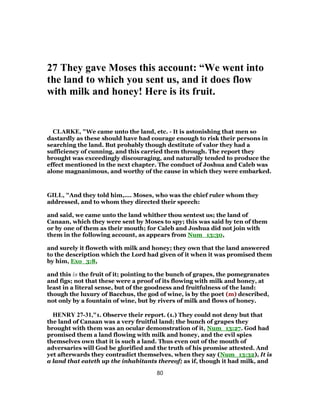

![PETT, "Numbers 13:27
‘And they told him, and said, “We came to the land to which you sent us, and surely
it flows with milk and honey, and this is its fruit.” ’
First came the positive news. They had inspected the land and it really was a land
flowing with milk and honey, and to prove it they produced its fruit. The promise of
a land flowing with milk and honey was central to Israel’s expectations. The very
words should have awakened faith. This was what Yahweh had promised them!
And it was there for the taking. See Exodus 3:8; Exodus 3:17; Exodus 13:5; Exodus
33:3; Leviticus 20:24.
TRAPP, "Verse 27
Numbers 13:27 And they told him, and said, We came unto the land whither thou
sentest us, and surely it floweth with milk and honey; and this [is] the fruit of it.
Ver. 27. And this is the fruit of it.] Plutarch (a) tells of the Gauls, that after they had
once a taste of the sweet wine of the grapes that grew in Italy, they inquired in what
country such sweet wine was: and after they had understood where such grapes
grew, they would never be at rest, till they had got that country. Sextus Rufus,
writing of Cyprus, saith, Cyprus famosa divitiis, paupertatem populi Rom. ut
occuparetur, solicitavit, Cyprus by her wealth tempted the Romans to seize it into
their hands. The pearls usually cast out with the flood, and gathered with the ebb,
drew Caesar’s affection for the conquest of Britain, as Suetonius (b) saith: God hath
given us here a grape of the heavenly Canaan, to edge our desires.
WHEDON, "27. Milk and honey — See Numbers 14:8, note. Thus far the report of
the twelve is unanimous; they all commend the richness and fruitfulness of the soil.
It is a common way with calumniators to begin by saying something good of the
person or plan they wish to injure and to end by speaking evil of him or that they
had first commended.
BI, "It floweth with milk and honey.
A land flowing with milk and honey
The idea suggested is, that the true disciples of the Lord Jesus are expected
to show to the world some illustration of the nature of the heavenly country
to which they are journeying. In a sense they have been there, and have
come back. But in what sense?
1. The idea with many persons is, that the future condition of man is so
completely different from this, that it is out of the question to attempt to
form a conception of it. Now, it is true, St. Paul tells us, “that eye hath
not seen, nor ear heard, neither have entered into the heart of man, the
82](https://image.slidesharecdn.com/numbers13commentary-170219125917/85/Numbers-13-commentary-82-320.jpg)

![saw descendants of Anak there.
GILL, "Nevertheless the people be strong that dwell in the land,.... Though
so plentiful and fruitful and desirable to enjoy, yet this objection lay against
all hopes and even attempts to possess it, as they thought; the strength of
the people, its present inhabitants, both in body and mind, being persons of
a large, and some of a prodigious stature, and to all appearance men of
valour and courage:
and the cities are walled and very great; and so inaccessible, and able to
hold out a long siege, and repel what force may be brought against them; so
that to attack them would be to little purpose:
and moreover we saw the children of Anak there: whom they had heard of
before, and so had the congregation of Israel, and many terrible and
frightful stories were told of them, and these they now saw with their eyes,
and very formidable they appeared to them; this seems to prove that others
beside Caleb and Joshua were at Hebron, where the sons of Anak lived,
Num_13:22; and so they might, and yet not be together with them.
COKE, "Numbers 13:28. We saw the children of Anak there— See Numbers
13:32-33 and Genesis 6:4. This exaggerated account of the cities and of the
inhabitants was given with a view to discourage the people from attempting a
country thus defended by walls almost impregnable, and by inhabitants as
formidable in number as gigantic in size.
PETT, "Numbers 13:28
“However the people who dwell in the land are strong, and the cities are fortified,
and very great, and moreover we saw the children of Anak there.”
But then came the downside. The people in the land were strong, and their cities
were well fortified, and very large. But what was even worse, the sons of Anak were
there, the dreaded Anakim. It was probably the last that made the most impact.
Superstitious dread accompanied talk about the Anakim. This was the language of
unbelief.
TRAPP, "Numbers 13:28 Nevertheless the people [be] strong that dwell in the land,
and the cities [are] walled, [and] very great: and moreover we saw the children of
Anak there.
84](https://image.slidesharecdn.com/numbers13commentary-170219125917/85/Numbers-13-commentary-84-320.jpg)
![Ver. 28. Nevertheless the people be strong.] Thus many amongst us wish very well to
heaven, speak glorious things of it, and could gladly go to it; but there is a lion in the
way: they complain, with these malcontents, of the strength of the Anakims, and the
impossibility of the conquest. It is a hard thing doubtless, to watch continually
against a spiritual enemy, to keep up the banks against the sea of lusts and passions;
to bear daily crosses without stooping; to carry the cup of prosperity without
spilling; to climb the hill of good duties without fainting; to go against the crowd
without sweating; to bear the reproach of Christ without buckling, &c. But hard
though it be, should we be discouraged? The sweetness of the honey makes the bears
break in upon the hives, contemning the stings. The merchant refuseth no adventure
for hope of gain: the hunter shrinketh at no weather for love of game: the soldier
declineth no danger for desire of spoil. The sweetness of God’s face, though to be
seen only in the dark glass of the ceremonies, cheered up those good souls, in their
hard and tedious travel to Zion. {Psalms 84:6, &c.}
WHEDON, " 28. Nevertheless — This word introduces the godless majority report;
godless because there is in it no reference to Jehovah. It is an infidel document; like
those of some modern scientists, correct in its facts, but false and atheistic in its
inferences. “Truly, the eye sees what it brings with it. They really went to look for
dangers, and of course they found them.” The truth is told respecting the strength of
the walled cities and the names of the Canaanitish tribes occupying different parts
of the land. But the opinions expressed in Numbers 13:31 are glaringly disrespectful
toward Him who had led Israel out of Egypt with his “stretched out arm,” and had
promised to drive out all enemies from the promised land. Men are just as culpable
for their opinions as for their acts, since opinions are the roots of conduct.
Cities… walled,… very great — “The eyes of weak faith or unbelief saw the towns
really towering up ‘to heaven.’ Deuteronomy 1:28. Nor did the height appear less
even to the eyes of faith, which does not hide the difficulties from itself, that it may
not rob the Lord who helps it over them of any of the praise that is justly his
due.” — Schultz.
29 The Amalekites live in the Negev; the Hittites,
Jebusites and Amorites live in the hill country;
and the Canaanites live near the sea and along the
Jordan.”
85](https://image.slidesharecdn.com/numbers13commentary-170219125917/85/Numbers-13-commentary-85-320.jpg)






![Yes, their report was evil, false, inaccurate, exaggerated, slanted, and perverted to
serve their lack of faith. It is not the first time, nor the last, that a majority has
shouted a lie to persuade the thoughtless to follow them instead of the true leaders.
"How exaggerated and one-sided is the distrust of God's promises ..."[23]
Caleb's magnificent challenge here stands out as the words of a true believer: "Let
us go up at once and possess it; for we are well able to overcome it."
Such noble words are worthy to be the motto of any church or of any believer. They
sprang from a heart of faith. Caleb's confidence was not in Caleb, but in the God of
Israel. The "giants" of Canaan struck no fear into his courageous heart, for he, like
Paul, knew "Whom he had believed" and was sure of his ability in that strength to
overcome.
"They brought up an evil report of the land ..." The Hebrew from which this is
translated is, "They made go at a defamation of the land."[24] This has the effect as
making their charges to be falsehoods, and certainly this nonsense about the land
eating up the people must rank as the yarn of a champion liar!
"The Nephilim ..." is translated "giants" in the Septuagint (LXX), and that is
probably the true meaning of it. "They are mentioned elsewhere only in Genesis
6:4."[25]
In regard to the questions that naturally arise concerning those "giants," Plaut has
the following:
"The Anakites were long understood to denote `giants.' Although anthropology
has no evidence that men of unusual size lived in Palestine during that period,
nevertheless the reason for the tradition is clear. "The existing dolmens and the size
and strength of the Canaanite fortresses suggest that only giants could have built
them. We find this same idea among the Greeks, who reported that huge walls of
their ancient cities had been built by the Cyclopes, giant artisans from Asia Minor.
This tradition has led to the expression `Cyclopean masonry,' to describe the huge
blocks used in constructing some ancient cities."[26]
The Biblical description of Goliath gives his height at "six cubits and a span," (1
Samuel 17:4), namely about 10 feet! There are occasional giants in nearly every
country. The famous Cape Breton Giant was a person of great size, as attested by
the wax image clad in clothes actually worn by him, and exhibited in the museum at
Halifax, Nova Scotia. Ethan Allen Crawford of Vermont was also a man of
incredible strength who lifted a horse up a thirty-foot cliff! A few of our current
basketball stars approach giant stature.
The next chapter reveals what a nation of cry-babies Israel was at this time, and this
is an appropriate place to take a closer look at what we shall call:
92](https://image.slidesharecdn.com/numbers13commentary-170219125917/85/Numbers-13-commentary-92-320.jpg)

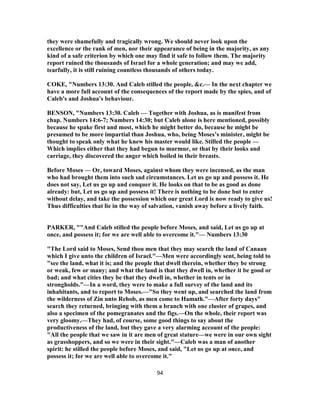



![evil world, and that apostate spirit, the devil.
2. There are adversaries in timid and faint-hearted associates.
3. The Israelites in their progress were made dependent on the Lord for
all things.
III. The resolution—“let us go up at once, and possess it.”
1. The title to it is sure. It is pledged in Christ; as heirs of God and joint
heirs with Christ. He is our Joshua and is gone to take possession for us.
2. We have means and ordinances by which needed strength is supplied,
and we are invited and enjoined to feed in the spiritual manner, and to
drink of the spiritual rock.
3. Here we have many foretastes of the good land. (Sketches of Four
Hundred Sermons.)
Difficulties in the way
1. The kingdom of heaven challenges the inquiry of all men. It addresses
an appeal to human reason, and to human trust. Though itself a
revelation, and therefore not to be handled as a common thing, nor to be
tested by common instruments, yet Christianity invites the most careful
inquest. It does not seek to rest upon the human intellect as a burden,
but to shine upon it as a light. ]f Christianity may be represented under
the image of a land, such as ancient Canaan, then it is fair to say of it,
that it offers right of way over its hills and through its valleys, that its
fruits and flowers are placed at the disposal of all travellers, and that he
who complains that the land is shut against him speaks not only
ungratefully but most falsely.
2. Different reports will, of course, be brought by the inquirers. The
result of the survey will be according to the peculiarities of the
surveyors. As streams are impregnated by the soils over which they flow,
so subjects are affected by the individualism of the minds through which
they pass. Thus Christianity may be said to be different things to
different minds. To the speculative man it is a great attempt to solve
deep problems in theology; to the controversialist it is a challenge to
debate profound subjects on new ground; to the poet it is a dream, a
wondrous vision many-coloured as the rainbow, a revelation many-
voiced as the tunes of the wind or the harmonies of the sea.
(1) Some inquirers will see all the hindrances.
(2) All will confess that there is something good in the laud.
(3) Those who hold back by reason of the difficulties will come to a
miserable end.
(a) We don’t escape by false reasoning.
(b) We don’t escape by fear.
98](https://image.slidesharecdn.com/numbers13commentary-170219125917/85/Numbers-13-commentary-98-320.jpg)
